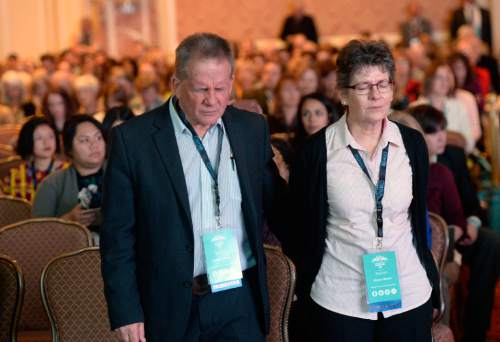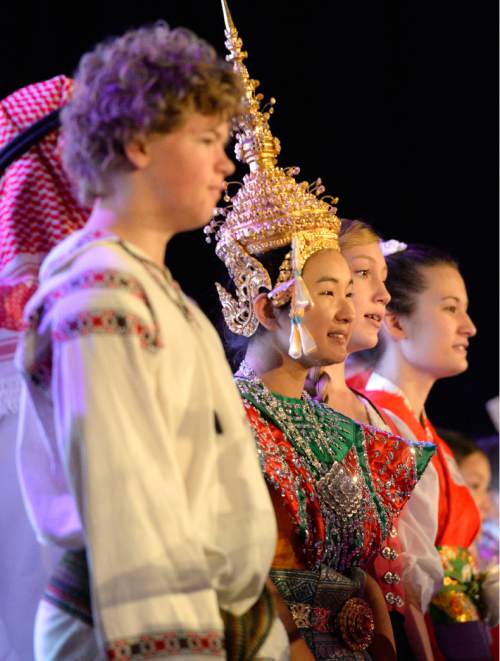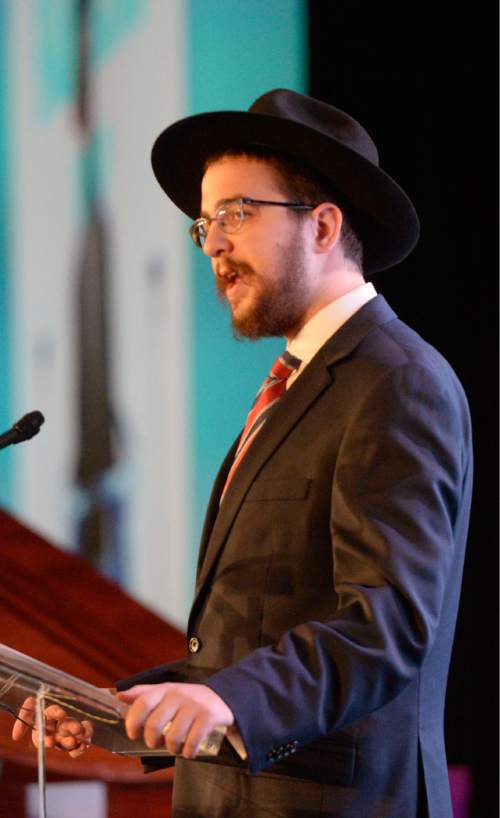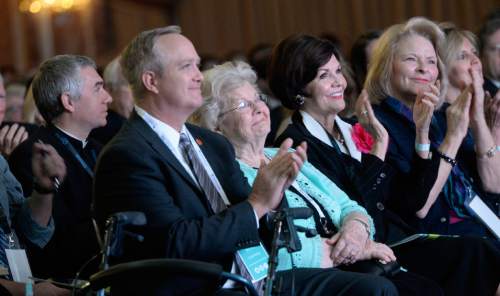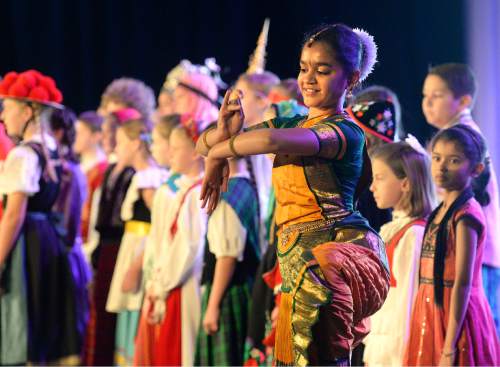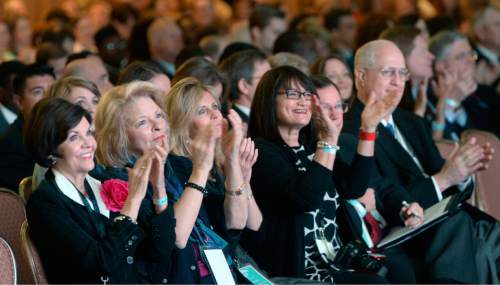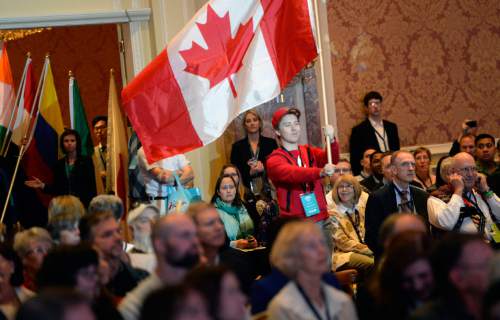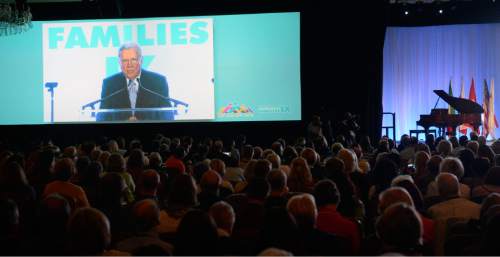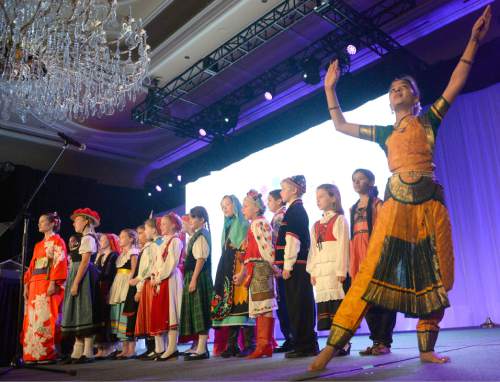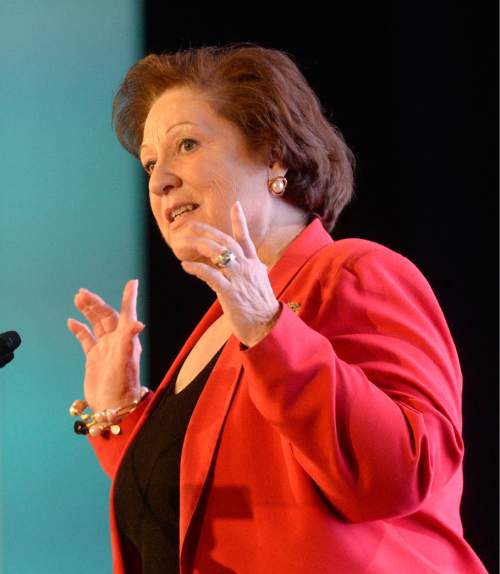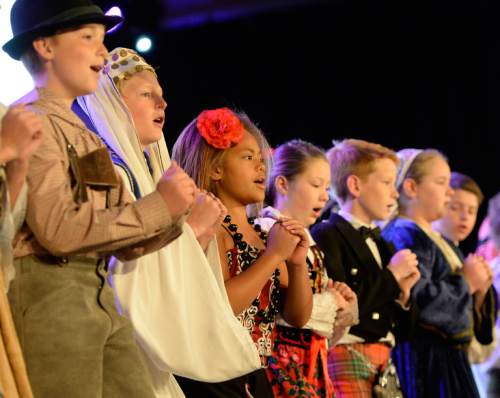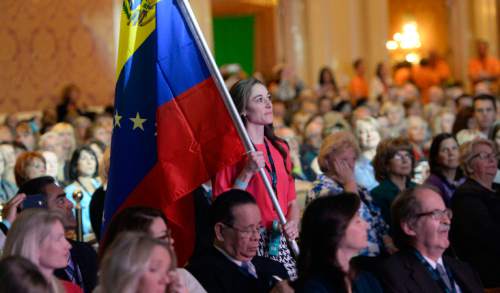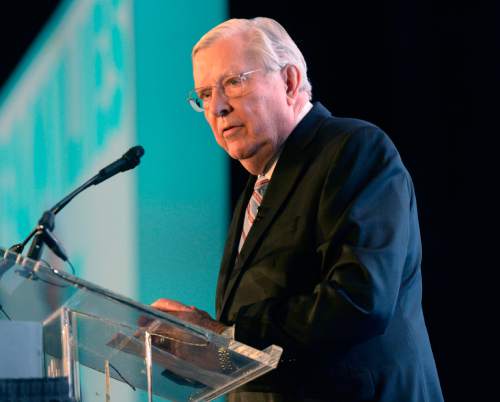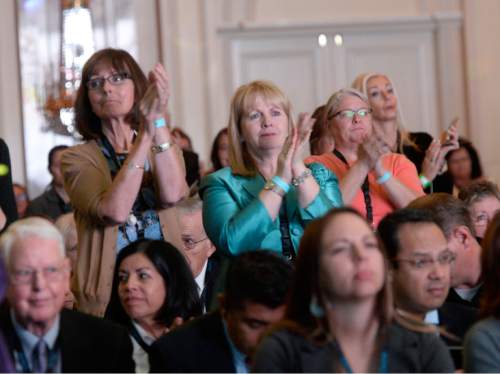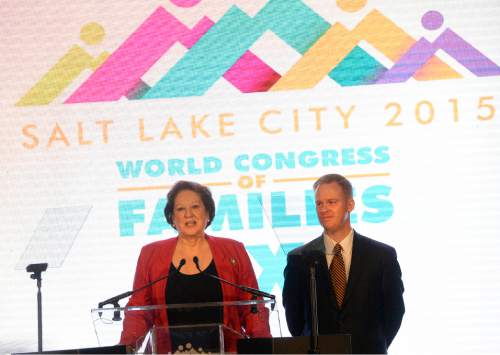This is an archived article that was published on sltrib.com in 2015, and information in the article may be outdated. It is provided only for personal research purposes and may not be reprinted.
The World Congress of Families, an international movement to celebrate and promote the "natural family," opened Tuesday in the global center of the LDS Church — with a Mormon apostle as the keynote speaker.
At the stroke of 9 a.m., Utah's International Children's Choir, dressed in traditional country costumes, began serenading more than a thousand participants as they took their seats in the giant Grand America Hotel ballroom in downtown Salt Lake City.
Some 500 "future leaders of the movement," as they were described, marched in, carrying flags from 50 nations largely in alphabetical order, starting with Argentina and continuing through to Switzerland.
The gathering's local organizer, Stan Swim, interim president of Salt Lake City's conservative Sutherland Institute think tank, welcomed foreign guests and other participants.
In addition to Mormon performers (violinist Jenny Oaks Baker and Nathan Osmond), the day's schedule offered a veritable "who's who" of Beehive State conservatives — including columnists Richard and Linda Eyre, Utah Eagle Forum President Gayle Ruzicka and United Families International founder Susan Roylance, as well as a slew of professors and staffers from LDS Church-owned Brigham Young University.
Historically, though, the Mormon connection to the congress was a tad more problematic. After all, it happened by accident and wasn't exactly welcome in all quarters.
Allan Carlson, the congress' founder and international secretary, was prompted to launch the movement in 1995 after chatting with some Russian Orthodox priests in Moscow about issues such as abortion, failing marriages, declining fertility and cohabitation.
The congress held its first international meeting in Prague in 1997, and, on the airplane rode home, Carlson was seated next to BYU law professor Richard Wilkins.
They talked all the way home, recalled Carlson, who was retiring at this meeting, and decided to form a partnership between Carlson's Howard Center for Family, Religion and Society in Rockford, Ill. and Wilkins' center at the Provo school.
The BYU lawyer, who died in 2012, became deeply involved in organizing the 1999 meeting in Geneva, persuading high-level Mormon leaders to observe, speak and participate.
The Church of Jesus Christ of Latter-day Saints was not buying into the objectives of every pro-family group present at the conference, Bruce Hafen, then of the faith's First Quorum of the Seventy, said at the time.
"There are a lot of groups here with an extensive political agenda," Hafen, now an emeritus LDS general authority. "Some of them use 'family' for issues that aren't necessarily related to the family. The church will not be aligned with the Christian right as a political action group."
The Utah-based faith was "not trying to insist on a monolithic program," he said. "The church supports a two-party system."
Wilkins, Hafen and then-Relief Society General President Mary Ellen Smoot and then-Young Women President General Margaret Nadauld all gave major speeches at the meeting.
Days before the gathering, however, Geneva's famed St. Pierre's Cathedral expressed concerns about LDS participation in its chapel, where the opening session was scheduled. Organizers assured the Swiss Reformed Church that, though Mormons were involved, the congress was sponsored by an interfaith group.
Unsatisfied, the cathedral withdrew permission to use its church, and the session shifted instead to the hotel ballroom, where the rest of the conference took place.
"It was an unfortunate decision," Carlson said at the time. "I was particularly disappointed by the lack of hospitality."
These days, it is the Mormons who are rolling out the welcome mats — including Nu Skin executive Steven Lund, a major congress donor — and promoting the faith's unique theology about forever families.
In a short speech that was equal parts sermon and argument, LDS apostle M. Russell Ballard spelled out Mormon teachings about salvation requiring marriage, the pre- and post-mortal experience and the need for marriages to be solemnized "for eternity" in an LDS temple. He then showed a video of children from various cultures singing the Mormon hymn, "I Lived in Heaven."
Ballard, third in line for the LDS Church's presidency, struck the same note of balance that Mormon leaders — most notably fellow senior apostle Dallin H. Oaks — have amplified since working to pass a landmark Utah anti-discrimination bill earlier this year.
"Although none of the parties achieved all they wanted," Ballard told the nearly full ballroom, "our work with the LGBT community and the Utah Legislature lessened the divisiveness in our communities without compromising on key principles."
While "traditional" marriage is at the core of LDS theology and should be defended vigorously, he said, believers need to treat those who disagree with kindness and civility.
"Just as we do not or should not shun family members with whom we disagree, we cannot and should not shun those who look or think or act differently than we do," Ballard said. "We demonstrate our best humanity when we show love and kindness to all of God's children. We demonstrate our discipleship when we refuse strident tones, when we refuse derisive labels."
Believers can be "specific and passionate about the benefits of man-woman marriage," the apostle said, "without disrespecting or injuring those who think otherwise."
Whether married or single, he said, "in the end, we are each a unique part of God's grand plan."
Erika Munson, co-founder of Mormons Building Bridges, a group seeking to strengthen LDS-LGBT ties, attended the speech and was "very encouraged."
"He did not use the divisive term 'natural family,' which has been hurtful to LGBT people," she said. "He said there is no place in a Christian discipleship for shunning or marginalizing anyone. These are important things to hear for LGBT Mormons and their families."
If marriage is the glue that holds society together, Munson added, "LGBT families can be models of love, loyalty, hard work and commitment against all odds, and make our communities stronger."
Gov. Gary Herbert welcomed the conference with brief remarks Tuesday evening alongside his wife, Jeanette, who promoted her Uplift Families initiative.
"Society [is] getting further and further away from the values we deem important," Jeanette Herbert said.
The governor drew criticism for speaking at the gathering because critics call its sponsor a hate group.
Twitter: @religiongal


